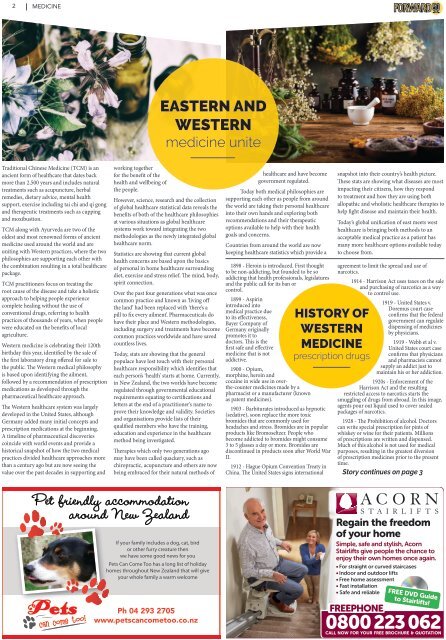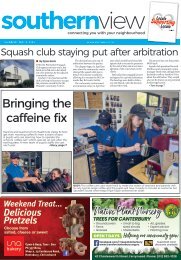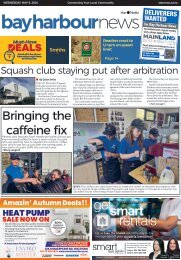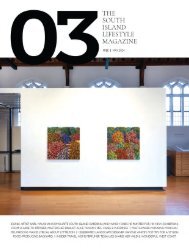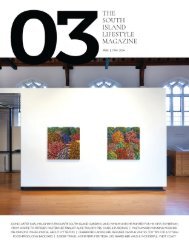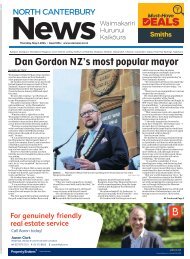The Star: August 30, 2018
You also want an ePaper? Increase the reach of your titles
YUMPU automatically turns print PDFs into web optimized ePapers that Google loves.
2 Medicine<br />
EaStErN aND<br />
WEStErN<br />
medicine unite<br />
Traditional Chinese Medicine (TCM) is an<br />
ancient form of healthcare that dates back<br />
more than 2,500 years and includes natural<br />
treatments such as acupuncture, herbal<br />
remedies, dietary advice, mental health<br />
support, exercise including tai chi and qi gong<br />
and therapeutic treatments such as cupping<br />
and moxibustion.<br />
TCM along with Ayurveda are two of the<br />
oldest and most renowned forms of ancient<br />
medicine used around the world and are<br />
uniting with Western practices, where the two<br />
philosophies are supporting each other with<br />
the combination resulting in a total healthcare<br />
package.<br />
TCM practitioners focus on treating the<br />
root cause of the disease and take a holistic<br />
approach to helping people experience<br />
complete healing without the use of<br />
conventional drugs, referring to health<br />
practices of thousands of years, when people<br />
were educated on the benefits of local<br />
agriculture.<br />
Western medicine is celebrating their 120th<br />
birthday this year, identified by the sale of<br />
the first laboratory drug offered for sale to<br />
the public. <strong>The</strong> Western medical philosophy<br />
is based upon identifying the ailment,<br />
followed by a recommendation of prescription<br />
medications as developed through the<br />
pharmaceutical healthcare approach.<br />
<strong>The</strong> Western healthcare system was largely<br />
developed in the United States, although<br />
Germany added many initial concepts and<br />
prescription medications at the beginning.<br />
A timeline of pharmaceutical discoveries<br />
coincide with world events and provide a<br />
historical snapshot of how the two medical<br />
practices divided healthcare approaches more<br />
than a century ago but are now seeing the<br />
value over the past decades in supporting and<br />
working together<br />
for the benefit of the<br />
health and wellbeing of<br />
the people.<br />
However, science, research and the collection<br />
of global healthcare statistical data reveals the<br />
benefits of both of the healthcare philosophies<br />
at various situations as global healthcare<br />
systems work toward integrating the two<br />
methodologies as the newly integrated global<br />
healthcare norm.<br />
Statistics are showing that current global<br />
health concerns are based upon the basics<br />
of personal in home healthcare surrounding<br />
diet, exercise and stress relief. <strong>The</strong> mind, body,<br />
spirit connection.<br />
Over the past four generations what was once<br />
common practice and known as ‘living off<br />
the land’ had been replaced with ‘there’s a<br />
pill to fix every ailment’. Pharmaceuticals do<br />
have their place and Western methodologies,<br />
including surgery and treatments have become<br />
common practices worldwide and have saved<br />
countless lives.<br />
Today, stats are showing that the general<br />
populace have lost touch with their personal<br />
healthcare responsibility which identifies that<br />
each person’s ‘health’ starts at home. Currently,<br />
in New Zealand, the two worlds have become<br />
regulated through governmental educational<br />
requirements equating to certifications and<br />
letters at the end of a practitioner’s name to<br />
prove their knowledge and validity. Societies<br />
and organisations provide lists of their<br />
qualified members who have the training,<br />
education and experience in the healthcare<br />
method being investigated.<br />
<strong>The</strong>rapies which only two generations ago<br />
may have been called quackery, such as<br />
chiropractic, acupuncture and others are now<br />
being embraced for their natural methods of<br />
Pet Pet friendly friendly around<br />
accommodation<br />
New Zealand<br />
around New Zealand<br />
If your family includes a<br />
If your family includes a<br />
If your dog,<br />
dog, family cat,<br />
cat,<br />
bird includes bird or<br />
or<br />
other<br />
other a dog, furry<br />
furry cat, bird<br />
creature or other then furry we creature have some then some<br />
we have good some news good for news you<br />
for you<br />
Pets Can Come Too has a long list of holiday<br />
Pets Can Come Too has a a<br />
homes throughout New Zealand that will give<br />
long list of holiday homes<br />
your whole family a warm welcome<br />
throughout New Zealand<br />
that that will give your whole<br />
family a warm welcome<br />
family warm welcome<br />
Ph 04 293 2705<br />
www.petscancometoo.co.nz<br />
Ph 04 293 2705<br />
www.petscancometoo.co.nz<br />
Ph 04 293 2705<br />
www.petscancometoo.co.nz<br />
healthcare and have become<br />
government regulated.<br />
Today both medical philosophies are<br />
supporting each other as people from around<br />
the world are taking their personal healthcare<br />
into their own hands and exploring both<br />
recommendations and their therapeutic<br />
options available to help with their health<br />
goals and concerns.<br />
Countries from around the world are now<br />
keeping healthcare statistics which provide a<br />
1898 - Heroin is introduced. First thought<br />
to be non-addicting, but founded to be so<br />
addicting that health professionals, legislatures<br />
and the public call for its ban or<br />
control.<br />
1899 - Aspirin<br />
introduced into<br />
medical practice due<br />
to its effectiveness,<br />
Bayer Company of<br />
Germany originally<br />
promotes it to<br />
doctors. This is the<br />
first safe and effective<br />
medicine that is not<br />
addictive.<br />
HIStory of<br />
WEStErN<br />
MEDIcINE<br />
prescription drugs<br />
1900 - Opium,<br />
morphine, heroin and<br />
cocaine in wide use in overthe-counter<br />
medicines made by a<br />
pharmacist or a manufacturer (known<br />
as patent medicines).<br />
1903 - Barbiturates introduced as hypnotic<br />
(sedative), soon replace the more toxic<br />
bromides that are commonly used for<br />
headaches and stress. Bromides are in popular<br />
products like Bromoseltzer. People who<br />
become addicted to bromides might consume<br />
3 to 5 glasses a day or more. Bromides are<br />
discontinued in products soon after World War<br />
II.<br />
1912 - Hague Opium Convention Treaty in<br />
China. <strong>The</strong> United States signs international<br />
snapshot into their country’s health picture.<br />
<strong>The</strong>se stats are showing what diseases are most<br />
impacting their citizens, how they respond<br />
to treatment and how they are using both<br />
allopathic and wholistic healthcare therapies to<br />
help fight disease and maintain their health.<br />
Today’s global unification of east meets west<br />
healthcare is bringing both methods to an<br />
acceptable medical practice as a patient has<br />
many more healthcare options available today<br />
to choose from.<br />
agreement to limit the spread and use of<br />
narcotics.<br />
1914 - Harrison Act uses taxes on the sale<br />
and purchasing of narcotics as a way<br />
to control use.<br />
1919 - United States v.<br />
Doremus court case<br />
confirms that the federal<br />
government can regulate<br />
dispensing of medicines<br />
by physicians.<br />
1919 - Webb et al v.<br />
United States court case<br />
confirms that physicians<br />
and pharmacists cannot<br />
supply an addict just to<br />
maintain his or her addiction.<br />
1920s - Enforcement of the<br />
Harrison Act and the resulting<br />
restricted access to narcotics starts the<br />
smuggling of drugs from abroad. In this image,<br />
agents pour out liquid used to cover sealed<br />
packages of narcotics.<br />
1928 - <strong>The</strong> Prohibition of alcohol. Doctors<br />
can write special prescription for pints of<br />
whiskey or wine for their patients. Millions<br />
of prescriptions are written and dispensed.<br />
Much of this alcohol is not used for medical<br />
purposes, resulting in the greatest diversion<br />
of prescription medicines prior to the present<br />
time.<br />
Story continues on page 3<br />
Regain the freedom<br />
of your home<br />
Simple, safe and stylish, Acorn<br />
Stairlifts give people the chance to<br />
enjoy their own homes once again.<br />
• For straight or curved staircases<br />
• Indoor and outdoor lifts<br />
• Free home assessment<br />
• Fast installation<br />
• Safe and reliable<br />
FREE DVD Guide<br />
to Stairlifts!<br />
0800 223 062<br />
CALL NOW FOR YOUR FREE BROCHURE & QUOTATION


